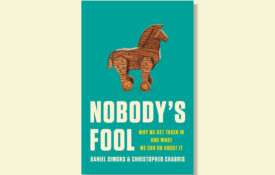-
2 Reasons Why We Need to Spend More Time Thinking About Nothing, According to a Psychologist
According to a classic study published in Perspectives on Psychological Science, it is likely that the more we use our brains, the less age-related cognitive decline we experience. But what does this really mean? Does it mean that
-
Tap Into the Wisdom of Your ‘Inner Crowd’
Take your best guess for the questions below. Without looking up the answers, jot down your guess in your notes app or on a piece of paper. Next, we want you to take a second
-

Nobody’s Fool: How to Avoid Getting Taken In
Podcast: How can our habits of thinking make us vulnerable to deception? How can we spot deception before it’s too late? Daniel Simons and Christopher Chabris answer these questions and more, drawing from their new book: Nobody’s Fool: Why We Get Taken In and What We Can Do About It.
-
Do We Actually ‘Hear’ Silence?
At a concert hall near Woodstock, N.Y., in August 1952, the pianist David Tudor played John Cage’s three-movement composition 4’33″. Doing so did not require enormous jumps with the right hand. Most people could play the
-
How to Learn Something New Every Day
Many people consider learning to be an active endeavor, one that takes place in a classroom with a teacher and homework and tests. This intentional form of education is just one way to acquire knowledge.
-
Uncovering the Mystery of Why Dogs Might Look Like Their Owners
Whether you’re at the dog park or just taking a stroll around the block, you’ve surely seen this before: A pup who looks — almost uncannily — like a miniature version of the human holding

